- Home
- Amelia C. Adams
Honoring Her Heart Page 4
Honoring Her Heart Read online
Page 4
“And was his response satisfactory?”
Mr. Hoffman shrugged. “I admit, I was hoping for a little more of a reaction, but he didn’t rise to my challenge, and I admire him for that. He was anxious to keep things peaceful, and I admit to being somewhat of a scalawag for trying to encourage him otherwise.”
“So, you’re a scalawag, are you?” Her lips twitched. She thought she could see that in him, but deep down, as though it was something he kept hidden.
“A bit of one, yes.”
“And where are you from? I keep hearing just a hint of something in your voice—not quite an accent, but it’s significant.”
“I’m from Canada.”
That made sense, but with a name like Hoffman . . . “And you’re Jewish?”
He laughed again. “Yes, I’m a Jewish Canadian. I’m sure you haven’t met many in your day.”
“There are a great number of things about you that have caught me off guard, Mr. Hoffman, and this is just another one to add to the list.”
He sat back and regarded her. “Oh? What are some of the things you’ve observed?”
She knew her face was flaming red, and she turned her head to the side in hopes that it wouldn’t be so noticeable. The sun hadn’t set yet, and she longed for the cover of darkness. “You’ve said that you’re an observer of human nature, and I noticed it at dinner—you were taking stock of the Roundys, listening to their comments and asking questions to clarify what they meant. I think . . .”
“Yes?”
It sounded so presumptuous, but he wanted to know what she was thinking, so she rushed on. “I think you have a vested interest in reading people, Mr. Hoffman. I don’t think it’s just a hobby for you. You seem very focused even when you’re trying to seem casual about it.”
“Do I?” He didn’t sound angry, but rather, thoughtful. “That’s an interesting observation of your own.”
“I wasn’t studying you in particular. That would have been earlier today.”
Another admission that made her blush. Goodness. She should stop talking altogether if she was going to keep embarrassing herself like this.
“And what did you notice earlier?”
“That you have the ability to coerce me into saying things that should never leave my mouth. You’re going to leave here thinking I’m the most indiscreet, brazen woman you’ve ever met.”
“There’s no chance of that whatsoever, Mrs. Olson. In fact, I was sitting here tonight thinking about just how very ladylike you are. What’s the most scandalous thing you’ve ever done?”
“Me?” Mary chuckled. “My mother would have died a thousand times if I’d ever been caught in a scandal. I was the very picture of propriety.”
Mr. Hoffman nodded. “Exactly as I thought, but I don’t sense a docile spirit in you. I sense a woman who has always longed to live free.”
Mary looked down at her clasped hands. His knack for reading people certainly did have a way of making her feel uncomfortable sometimes. “You’re right,” she replied. “I’ve always wanted to travel and to ride a camel and to sail on a Chinese junk. I’ve even thought about wearing trousers and climbing the face of a jagged mountain. Being my mother’s daughter . . . It was a good life, I assure you, but so confining.” She paused, then laughed. “I used to love sliding down the stairs when I was a little girl. I’d sit on a pillow as though it were a toboggan and thump all the way to the bottom. I’d have to keep a sharp eye on the drive, though, so I wouldn’t get caught by my mother coming home. There was a window at the top of the stairs, and I’d peek through it before every turn to make sure the buggy hadn’t returned.”
Mr. Hoffman laughed. “There’s the spark I’ve suspected was inside you, Mrs. Olson. It lives in the heart of that little girl—and I believe that little girl would like to be remembered more often. May I call you by your Christian name? May I help you remember the child who lives within you still?”
Mary smiled, although it pulled at her heartstrings to do so. “My name is Mary, but in actuality, it’s Marigold.”
Mr. Hoffman looked at her with curiosity. “This sounds like a story I must hear.”
Mary looked out over the yard. Some grasshoppers were leaping here and there in the tall grasses that lined the property, and she wondered if they had any tasks in the world besides eating, sleeping, and enjoying their lives. What would that be like?
“My father’s mother lived with us for a time before she passed away,” Mary said at length. “She was a spunky woman—full of sass and vinegar. Her health started to fade the year before I was born, but that never kept her from stating her opinions. When I was born, she looked into my face and told my father that I was just as sweet as one of the marigolds growing in the garden, and that should be my name. Well, my mother didn’t agree. I’ve already given you a hint of her practical side, and the idea of having a child named after a flower? She couldn’t abide the thought.”
Mr. Hoffman chuckled. “I can imagine it. Go on.”
“My father wanted to honor his mother’s wishes, so he insisted on naming me Marigold, but told my mother she could call me Mary instead. That compromise seemed to appease both women, so I was Marigold when sitting at my grandmother’s bedside, and I was Mary everywhere else.”
“How long did your grandmother live after that?”
“I was ten when she passed away.”
“And your mother?”
Mary looked at Mr. Hoffman with surprise. “How did you know she’s gone too?”
He lifted one shoulder. “You’re still living in her shadow, and the dead have a way of haunting us—even the friendly dead.”
Mary pressed her lips together and shook her head. “You should become a fortune teller in a traveling snake oil show, Mr. Hoffman.”
“Christopher, please. You’ve granted me the gift of your Christian name—allow me to return that gift.”
“Very well, Christopher,” she replied. “Yes, my mother has passed on. That was five years ago. My father is still alive and lives in Pittsburgh.”
“And you live in Colorado?”
“I came out here with my husband. He was an inspector—his job was to travel to the different construction sites and make sure that the tracks were being laid properly and so forth. He was killed in an accident—he was crushed when the brakes on one of the carts gave way.”
“I’m so sorry, Marigold. I can’t even imagine going through something like that.”
His use of her full name wasn’t lost on her, but she didn’t have the heart to mention it at the moment. She’d gone right back to that moment when the sheriff had come to her door, his hat in his hands, to tell her the sorrowful news.
“It was difficult,” she said at long last. “But he’d left me some money and this house, and I decided that I was going to stand on my own two feet and make a go of it running a boarding house. Patty showed up on my doorstep not long after, saying she’d heard that I was looking for a housekeeper, and she’s been my rock ever since.”
“She’s a treasure, most certainly,” Christopher replied.
“You know, it’s odd . . . I’d only started thinking about hiring a housekeeper that morning. I hadn’t placed an ad or anything yet. I’ve always just assumed she was heaven sent.”
“Well, after tasting her bread, I’d have to agree with that assessment.” Christopher chuckled, then grew solemn again. “Taking out an ad . . . tell me about your newspaper here in town.”
“It’s called the Creede Candle, and it’s run by a man named Mark Carroll,” Mary replied. “It’s not far from Mr. Thurgood’s office. If I may ask, why do you need to take out an ad in our newspaper? Aren’t you nearly finished with your business here?”
“Are you ready to be done with me?”
She hadn’t meant for her question to sound unwelcoming. In fact, she’d been hoping to sound just the opposite—the more she spoke with Christopher, the more she wanted to do it again, and she didn’t want him to be in a hurry to
leave.
“Oh, no, not at all,” she rushed to explain. “I was just thinking, though, that you haven’t actually said how long you’d need the room.” That wasn’t the most convincing explanation, but it was the best she could do, feeling as flustered as she did.
“I don’t actually know. Tomorrow is Saturday, and I don’t believe Mr. Thurgood has office hours again until Monday because we discussed getting together then to look at properties, so I’ll be here at least until Tuesday . . . probably longer, depending on banks and so forth . . .”
Mary sat very still while Christopher worked out his schedule, hoping he’d continue to add days. Yes, the income from the room rental would be very nice, but it was his company she wanted most of all.
“So you see, I really have no idea,” he concluded with a chuckle.
“I’m glad to hear it. I haven’t had such pleasant conversations for a long time,” she admitted.
“Neither have I.” He stood up slowly, arching his back in a stretch. “It’s been a long day, and I believe I’ll head off to bed. Goodnight, Marigold.”
“Goodnight, Christopher,” she replied softly.
It wasn’t until she was in bed that she realized how neatly he’d sidestepped her question—the one about his focused interest in human nature. There was more to him than met the eye, she was sure of it, and she’d enjoy figuring out what it was.
***
“Thank you so much for letting me come over,” Mercy said as she set her bushel of peaches on the table. “I need to get these peaches canned, and there just isn’t room in our tiny kitchen.”
“You can use our kitchen any time.” Mary peered into the first box Mercy had brought in. A dozen or so Mason jars lined the bottom, looking a little dusty. “May I help? I can wash these up for you.”
“I’d appreciate it. A sweet elderly lady in our neighborhood gave them to me—she said they’d been sitting in her attic for a few years and needed a good home.”
“Yes, a few years sounds about right.” Mary pulled them from their box and set about washing them while Mercy prepared the fruit.
“So, how are things going with Mr. Hoffman?” Mercy asked.
“He’s been an excellent boarder so far.”
“And?” Mercy pressed.
“And he’s fun to talk to.” Mary paused in the middle of drying a jar. “There’s something different about him, something out of the ordinary. He notices things other people don’t.”
“I thought so too just from chatting with him on the train,” Mercy replied. “I was hoping that he might consider moving to Creede once he buys property here.”
“It sounds to me like he’s buying property in several different places. I don’t know why he’d choose to settle here out of all his choices—and he’s originally from Canada. He might want to return there when he’s done with his travels.”
“You can’t think of a single reason why he might want to stay in Creede?” Mercy raised an eyebrow.
“Gracious. I think you and Patty have teamed up against me.” Mary set the jar she was holding on the table. “If I didn’t know better, I’d say you were trying to marry me off.”
“What if that’s exactly what we’re trying to do? Mrs. Olson, aren’t you lonely?”
“I might be lonely once in a while, but that doesn’t mean it’s time to rush into a relationship with a man I’ve just met. Besides, you should call me Mary. If you’re going to plan my life out for me, we should be on more familiar terms.”
Mercy grinned. “I agree, especially to the part where I get to plan out your life.”
“I didn’t say I was giving you permission to do it. I just acknowledged that you intend to do it whether I like it or not.”
“See? I knew we were good friends—you understand me so well.” Mercy placed the next peach pit into the small bowl where she was collecting them. “What if he did move here? What would happen next?”
Mary glanced over her shoulder. “You do realize he could walk in here any minute, don’t you? What would he think, hearing us talk like this?”
“He’s not going to walk in. I saw him heading down the street as I pulled up. That little bell on your front door will give us plenty of warning if he comes back. It was quite brilliant of you to install that, you know.”
“Yes, I did it so I could talk about my boarders behind their backs,” Mary said wryly. She sat down next to Mercy and began helping her slice peaches. “If Christopher were to move here—”
“Oh, so it’s Christopher now?”
Mary ignored her. “If he were to move here, I wouldn’t mind if he called once in a while. Beyond that, I really can’t say. I’m not a fortune teller.”
“But you know what your heart wants,” Mercy said.
“My heart . . .” Mary sat back and rested her hands on the table, sticky with peach juice. “My heart is confused. When I married Vernon, my heart became his, and I believed that’s where it would always belong. Now that he’s gone, I know I have the choice to give it to someone else, but that feels . . . I don’t know. Like a betrayal. Like I’ve given up on what we had together.”
“It’s not a betrayal,” Mercy protested. “That’s completely different! Neither of you chose to leave the other.”
“But if I chose to love someone else . . .”
Mercy reached out and touched Mary’s hand, ignoring their mutual stickiness. “I can’t tell you what to do or how you should feel, but I will say this—if life does give you a second chance at love, I don’t think it would be wrong of you to take it.”
Mary’s eyes began to fill with tears, but she refused to let them fall. Instead, she smiled. “I’m sure Christopher is a very nice man, but that doesn’t mean I’m supposed to develop feelings for him, and it would be premature to make these decisions before we actually know what’s going on. He’ll most likely purchase some land and be on his way, and I’ll go on just as I was before. I’m not at all unhappy, Mercy. Please don’t feel sorry for me.”
“I know you’re not unhappy. I’d just like to see you a bit more happy.”
The kitchen door opened, and Patty came into the house with a sack over her arm. “Toria helped me find all the spices I need, and she even had a jar left of those cherry preserves,” she said. “Mr. Hoffman said at breakfast that he was especially fond of cherry preserves, and I thought some might be nice as an afternoon snack.”
“I don’t think he meant to hint that you should run out and buy some,” Mary said doubtfully.
“Well, of course he didn’t mean to hint! He’s a gentleman, and gentlemen don’t hint. But that doesn’t mean I can’t do something a little nice for him. He did empty out the scrap bucket for me this morning.” Patty spoke over her shoulder while placing the spices on their shelf.
“Did he? That was very kind.”
“Of all the chores I do around here, that one just irritates me the most for some reason, but he just came right along and did it. Almost took it right out of my hands. Best surprise I’ve had for a while.” Patty hung her shopping bag on a hook by the door, then sat down across from Mercy and Mary. “What have the two of you gotten yourselves into this time?”
“We’re canning peaches,” Mercy said. “Although they do look like a mess . . . I’m not very good at this.”
“You’re doing more than fine,” Mary told her. “And by the time they’re in the bottles, no one will care what they look like because the color will be so pretty.”
Patty shook her head. “Next time, just wait for me. I’ll show you a thing or two about slicing peaches. It takes a certain knack . . . and I’m sorry to say, neither of you have it.”
Mary pretended to be offended. “I have lots of knack!”
“Yes, you do, but not with this,” Patty said. “Now wipe that sulky look off your face and find something else useful to do while I help Mrs. Granger here finish up.”
“Did you hear that? Mrs. Granger,” Mercy said.
“Yes, I heard. I have a f
eeling I’m going to hear it a lot, the way some people like saying it.” Mary rose from the table. “All right, I’ll wash my hands and go dust the parlor. Unless you think I’m no good at that, Patty?”
“Oh, you’re perfectly fine at dusting,” Patty said complacently. “Go right ahead.”
Mary smiled as she washed the sticky peach juice off her hands. It was a good thing she loved Patty like a sister.
Chapter Five
“What do you think of my idea?” Christopher looked at Ranse across the table at the Hearth and Home restaurant. The deputy had listened carefully while Christopher outlined his plan, but he hadn’t given any indication of his opinion.
“I think it could work—but then again, it might not,” Ranse replied slowly “You’re assuming that Thomas Wells has easy access to a newspaper, and that he reads it.”
“But there’s little to no risk in trying,” Christopher pointed out. “As far as driving someone out of hiding, this is the least dangerous way I can think of. And if he doesn’t read it, a friend might, and tell him.”
Ranse nodded. “So you’re asking me to have some extra men on hand once the advertisement is printed—I can do that. We can move in and arrest him as soon as he sets foot in town—we have enough evidence to convict him for his other shenanigans.”
“Yes, but I want to learn what I can about his organization,” Christopher replied. “Is he working for someone, or is he operating alone? If he is part of something bigger, I’d like to take a crack at that while we’re at it.”
Ranse chuckled and shook his head. “You always have enjoyed going after the big dogs.”
“It doesn’t do any good to arrest all the small players if there’s someone behind them calling the shots—they’ll just hire more players, and we haven’t really accomplished anything.”
“You’re right, of course. You’re always right.” Ranse looked up as their pretty hostess set plates of pie in front of them. “Thank you, Mrs. McRae,” he said with a nod.
“You’re welcome, Deputy. How was your meal?”

 Honoring Her Heart
Honoring Her Heart Buttons and Bows
Buttons and Bows An Agent for Emily
An Agent for Emily Christmas Catch-Up VIII (River's End Ranch)
Christmas Catch-Up VIII (River's End Ranch) A Rancher for Rowena
A Rancher for Rowena Candice (Seven Sisters Book 6)
Candice (Seven Sisters Book 6) Butterfly Kisses
Butterfly Kisses A Stitch in Time
A Stitch in Time Buttons and Bows (The Sewing Circle Book 3)
Buttons and Bows (The Sewing Circle Book 3) Sidearms and Songbirds (Hearts of Nashville Book 3)
Sidearms and Songbirds (Hearts of Nashville Book 3) Herd to Breathe
Herd to Breathe The Ties That Bind
The Ties That Bind Rhyme or Reason
Rhyme or Reason Revelations (Brody Hotel Book 4)
Revelations (Brody Hotel Book 4) Phoebe's Fate (Burnt River Contemporary Western Romance Book 9)
Phoebe's Fate (Burnt River Contemporary Western Romance Book 9) And Something Blue (Main Street Merchants Book 1)
And Something Blue (Main Street Merchants Book 1)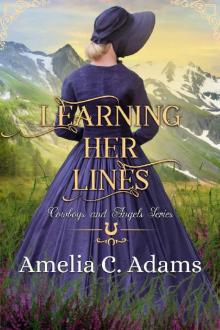 Learning Her Lines
Learning Her Lines Connections
Connections The Turn of a Wheel (Kansas Crossroads Book 17)
The Turn of a Wheel (Kansas Crossroads Book 17) Just Desserts (Main Street Merchants Book 4)
Just Desserts (Main Street Merchants Book 4) An Agent for Anna
An Agent for Anna An Agent for Esme
An Agent for Esme A Handyman for Helen
A Handyman for Helen Scented Sensibility
Scented Sensibility Addie's Adventurer
Addie's Adventurer Defying the Darkness
Defying the Darkness Riding the Rails
Riding the Rails Sugar And Spice (Main Street Merchants Book 7)
Sugar And Spice (Main Street Merchants Book 7) An Agent for Cynthia
An Agent for Cynthia In The Stars (Main Street Merchants Book 6)
In The Stars (Main Street Merchants Book 6)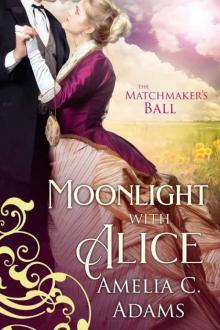 Moonlight With Alice (The Matchmaker's Ball Book 3)
Moonlight With Alice (The Matchmaker's Ball Book 3) Five Golden Rings (Main Street Merchants Book 3)
Five Golden Rings (Main Street Merchants Book 3) Between The Lines (Main Street Merchants Book 5)
Between The Lines (Main Street Merchants Book 5)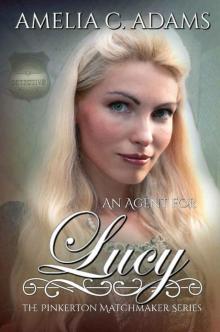 An Agent for Lucy
An Agent for Lucy Jessica (Seven Sisters Book 2)
Jessica (Seven Sisters Book 2) A Passing Glance
A Passing Glance Pet Peeves
Pet Peeves RNWMP: Bride for Joel
RNWMP: Bride for Joel Bowing to Betsy (The Matchmaker's Ball Book 11)
Bowing to Betsy (The Matchmaker's Ball Book 11) Rebekah (Seven Sisters Book 4)
Rebekah (Seven Sisters Book 4) A Joyful Noise (Kansas Crossroads Book 14)
A Joyful Noise (Kansas Crossroads Book 14) Her Second Chance Hometown Groom
Her Second Chance Hometown Groom A Christmas Promise (Kansas Crossroads Book 16)
A Christmas Promise (Kansas Crossroads Book 16) Bride for Samuel
Bride for Samuel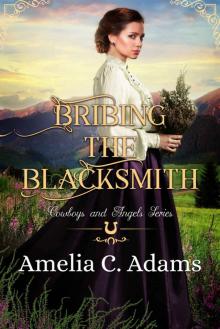 Bribing the Blacksmith (Cowboys and Angels Book 9)
Bribing the Blacksmith (Cowboys and Angels Book 9) RNWMP: Bride for Samuel (Mail Order Mounties Book 12)
RNWMP: Bride for Samuel (Mail Order Mounties Book 12) Tea for Two
Tea for Two The Bitter and the Sweet (Kansas Crossroads Book 9)
The Bitter and the Sweet (Kansas Crossroads Book 9) Frank (Seven Sons Book 6)
Frank (Seven Sons Book 6) A Cattleman for Cora
A Cattleman for Cora Paislee's Path (River's End Ranch Book 48)
Paislee's Path (River's End Ranch Book 48) Accidental Agent (River's End Ranch Book 3)
Accidental Agent (River's End Ranch Book 3)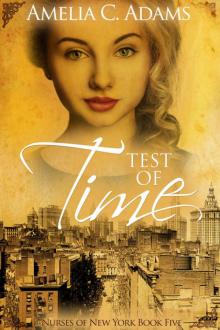 Test of Time (Nurses of New York Book 5)
Test of Time (Nurses of New York Book 5) RNWMP: Bride for Michael (Mail Order Mounties Book 24)
RNWMP: Bride for Michael (Mail Order Mounties Book 24) Loving the Landlord
Loving the Landlord The Dark and the Dawn (Kansas Crossroads Book 3)
The Dark and the Dawn (Kansas Crossroads Book 3) Candy Crush
Candy Crush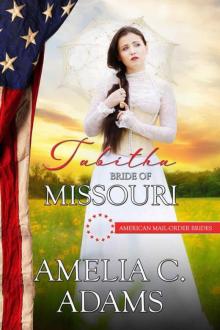 Tabitha: Bride of Missouri (American Mail-Order Bride 24)
Tabitha: Bride of Missouri (American Mail-Order Bride 24)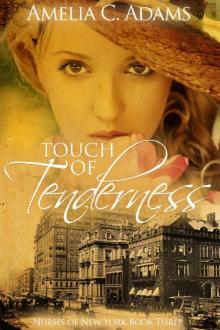 Touch of Tenderness (Nurses of New York Book 3)
Touch of Tenderness (Nurses of New York Book 3) Lucky Lifeguard (River's End Ranch Book 28)
Lucky Lifeguard (River's End Ranch Book 28) Heartstrings (Brody Hotel Book 2)
Heartstrings (Brody Hotel Book 2) Heart of Hearts (Nurses of New York Book 4)
Heart of Hearts (Nurses of New York Book 4) Hope_Bride of New Jersey
Hope_Bride of New Jersey A Careless Wind (Kansas Crossroads Book 7)
A Careless Wind (Kansas Crossroads Book 7) An Agent for Emily (The Pinkerton Matchmaker Book 28)
An Agent for Emily (The Pinkerton Matchmaker Book 28) A Twisted Fate
A Twisted Fate Delivering Destiny (River's End Ranch Book 23)
Delivering Destiny (River's End Ranch Book 23)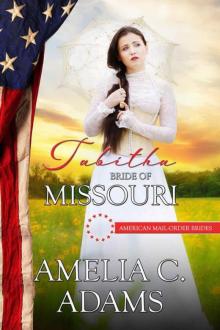 Tabitha_Bride of Missouri
Tabitha_Bride of Missouri A Wrangler for Wynonna
A Wrangler for Wynonna RNWMP_Bride for Peter
RNWMP_Bride for Peter An Unspoken Dream (Kansas Crossroads Book 13)
An Unspoken Dream (Kansas Crossroads Book 13) Generations
Generations Utah Sunrise (Rocky Mountain Romances Book 1)
Utah Sunrise (Rocky Mountain Romances Book 1) Bride for Jonathan
Bride for Jonathan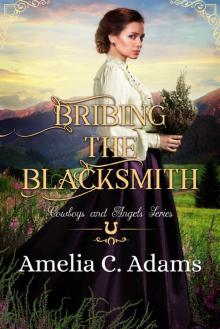 Bribing the Blacksmith
Bribing the Blacksmith A Clean Slate (Kansas Crossroads Book 4)
A Clean Slate (Kansas Crossroads Book 4) Hope: Bride of New Jersey (American Mail-Order Brides 3)
Hope: Bride of New Jersey (American Mail-Order Brides 3) Rugged Rockclimber (River's End Ranch Book 8)
Rugged Rockclimber (River's End Ranch Book 8) RNWMP_Bride for Michael
RNWMP_Bride for Michael RNWMP: Bride for Joel (Mail Order Mounties Book 4)
RNWMP: Bride for Joel (Mail Order Mounties Book 4) Tea For Two (Cowboys & Angels Book 15)
Tea For Two (Cowboys & Angels Book 15) Sweet Georgia Peach
Sweet Georgia Peach RNWMP: Bride for Peter (Mail Order Mounties Book 20)
RNWMP: Bride for Peter (Mail Order Mounties Book 20) A Clear Hope (Kansas Crossroads Book 5)
A Clear Hope (Kansas Crossroads Book 5) Meredith's Mistake (Grandma's Wedding Quilts Book 4)
Meredith's Mistake (Grandma's Wedding Quilts Book 4) RNWMP_Bride for Samuel
RNWMP_Bride for Samuel The Whisper of Morning (Kansas Crossroads Book 6)
The Whisper of Morning (Kansas Crossroads Book 6) RNWMP: Bride for Jonathan (Mail Order Mounties Book 8)
RNWMP: Bride for Jonathan (Mail Order Mounties Book 8) Santa's Shopkeeper (River's End Ranch Book 18)
Santa's Shopkeeper (River's End Ranch Book 18) A Broken Wing (Kansas Crossroads)
A Broken Wing (Kansas Crossroads)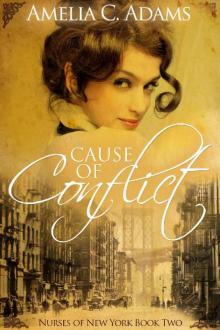 Cause of Conflict (Nurses of New York Book 2)
Cause of Conflict (Nurses of New York Book 2) A Free Heart
A Free Heart A New Beginning
A New Beginning The Calm of Night (Kansas Crossroads Book 10)
The Calm of Night (Kansas Crossroads Book 10) Bride for Calvin
Bride for Calvin Sea of Strangers (Nurses of New York Book 1)
Sea of Strangers (Nurses of New York Book 1)